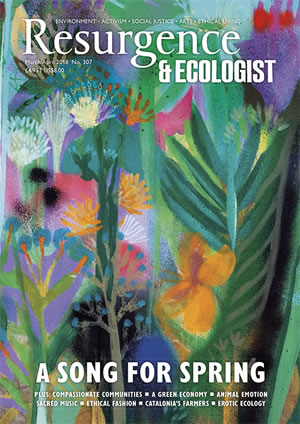This manifesto is a call to all people. Recognising compassion as a fundamental human quality present in all of us, either as a potential or in various stages of realisation, it is a call for the creation of more Compassionate Communities.
We all care for our friends and family. We freely offer kindness and help to neighbours and strangers in times of trouble, and such care is the basis for friendship and trust. Without this generosity of heart any degree of humane society would simply not be possible. Yet increasingly, across the world, we see societies dominated by greed, envy, intolerance, violence, repression and fear. Such developments reflect a failure of compassion and emotional literacy, both at the individual level and in organised group and state activity.
So this manifesto is a call to action.
While calling on individuals to challenge and reject all use of violence and aggression, both personal and public, this manifesto for Compassionate Communities insists on the need for a social movement embodying forms of political activity that encourage the fundamental values of human compassion in all significant aspects of our lives – in education, business, health and welfare provision, in religion and in politics at local, national and international levels, and in proper care for the natural environment, which sustains all our lives.
COMPASSIONATE COMMUNITY IN THE LIFE OF INDIVIDUALS
Care for one another is the only sane basis of human society. Kindness to our family and friends, our neighbours and our community members is the true basis for quality in life, as well as quality of life. Individuals have a responsibility to the people around them, and Compassionate Communities call on us all to respect this responsibility. This means turning away from violence and oppression as a solution to problems. It insists that difficulties must be resolved by a commitment to dialogue and cooperation underpinned by human kindness.
Emotions and desires, whether physical, sexual or psychological, exist as a human reality, but acts of violence and aggression are a failure of compassion and emotional literacy, a quality that needs to be nurtured from birth to death in all of us. Emotional literacy is a way of respecting the often difficult range of human emotions while not being at their mercy, and is a fundamental element in the life of Compassionate Community. By caring for others while finding ways to express emotions without causing them physical, sexual or psychological harm, Compassionate Community rejects racism, sexism and other forms of repression at an individual level, while celebrating diversity of race, gender, sexuality, politics and religion in wider society.
COMPASSIONATE COMMUNITY IN EDUCATION
True education goes beyond the acquisition of knowledge. It has a moral purpose, and for that reason the development of compassion needs to be included in all educational programmes. This requires education in the values of emotional literacy as the mature way of dealing with difficult emotions while avoiding the harm that they might otherwise cause.
Information is now available to all who have access to electronic media, so the capacity to recall large amounts of remembered knowledge is no longer needed to form harmonious societies. What we need to learn is skill in accessing this information and the understanding of how to use it wisely. Compassion is an act of the sympathetic imagination, so the creative use of the imagination is an ethical skill for our children to acquire if they are to show proper care for others, for their communities, and eventually for their own children, while developing sensitivity to the natural environment, which supports their lives.
COMPASSIONATE COMMUNITY IN BUSINESSES AND MEDIA
Profit is a prerequisite for businesses to exist. However, the responsibility of compassionate businesses is not solely to generate profit. Businesses need to care for their employees. They need to ensure that their activities leave the world in a better state for our children and our children’s children. This means ensuring that business methods do not damage the health and welfare of people or the natural environment. Compassionate Communities call on all businesses to adopt and promote compassionate activities, including the following:
• Compassionate workplace policies that ensure proper care for the welfare and morale of employees, including support at times of stress, ill health and loss.
• Environmental care to ensure that business activities support improvement of the environment and act responsibly to avoid or repair any environmental harm.
• Rejection of corruption. Corruption is persuasion used in the absence of compassion, regardless of its impact on others. It is a manifestation of greed both in the person giving the bribe and in the person receiving it. It is a failure of compassion and emotional literacy.
By definition, products, such as those of the arms industry, that cause harm to humans and the environment can have no place in the world of Compassionate Community.
Compassionate Communities call on all media of mass communication to promote human values of equity, compassion and care, and to desist from the propagation of exploitation, racism and oppression.
While recognising that accumulation of wealth and power is part of human society, Compassionate Communities call on all who have accumulated those advantages to use their assets and resources for the present and future benefit of the world around them.
COMPASSIONATE COMMUNITY IN RELIGION
Spiritual expression is a part of human cultural evolution. Compassionate Communities call on all religions to respect diversity of belief and to embrace compassion and kindness as fundamental human values that transcend differences of creed and practice. Without those values religion is of no true help, either to individuals or to societies. Compassionate Community calls for all religions to reject violence of any kind and to cease coercing others to adopt and acquiesce in their beliefs. In place of such aggressive practice, it insists on tolerance and respect for diversity as fundamental moral and spiritual values.
COMPASSIONATE COMMUNITY IN POLITICS
Politics conducted without compassion causes harm. Compassionate Community calls on all political activity, from individual to national and international state levels, to reject every form of violence and oppression. It calls on individuals to challenge governments to adopt compassionate policies and promote legislation that improves welfare for all, irrespective of race, cultural diversity, religious belief or gender. National boundaries need to be respected, but not as an end in themselves. A Compassionate Nation prioritises the quality of the life of its citizens above the acquisition by the state of influence, power or wealth.
Compassionate politics will
• Reject violence and oppression of any sort.
• Care for the rights and welfare of individuals.
• Reject corruption and greed as acceptable means and motive for action.
Because productivity, growth and profit alone are not sufficient value to ensure general welfare, Compassionate Government will legislate to enable and advance the creation of compassionate communities in neighbourhoods, workplaces and educational institutions.
It will embrace renewable resources as the primary means of energy production.
It will care for the environment and the wider wellbeing of future generations.
COMPASSIONATE COMMUNITY IN HEALTH AND WELFARE
Healthcare is provided solely to benefit humans and not for profit. The pharmaceutical industry has a responsibility to ensure that its products do not cause harm and are not sold for the sake of profit alone. Health is not solely about wellness. It is also about the need to live within compassionate societies. To quote from Professor Allan Kellehear’s Compassionate City Charter,
“People who live with chronic ill health, life-threatening or life-limiting illness, their caregivers, and the bereaved are segmented social groups, forced to experience lifestyles that are commonly socially hidden and disenfranchised from the wider society. Outside of the health services that deal specifically with their immediate problems, these populations suffer from a range of other troubles that are separate but linked to their health conditions or social circumstances – loneliness, isolation, job loss, stigma, depression, anxiety and fear, and even suicide. These populations also suffer from a range of other debilitating health problems often caused by their social and psychological troubles – insomnia, cardiac arrhythmias, chronic fatigue and headaches, hypertension, and gastric-intestinal disorders.
“Compassionate Cities are communities that publicly recognize these populations, and these needs and troubles, and seek to enlist all the major sectors of a community to help support them and reduce the negative social, psychological and medical impact of serious illness, caregiving, and bereavement. A compassionate city is a community that recognizes that care for one another at times of health crisis and personal loss is not simply a task solely for health and social services but is everyone’s responsibility.”
As these experiences will be part of all of our lives, supporting those who suffer ill health, and those who care for them, is the responsibility of all. A compassionate society squarely recognises this social fact and seeks to support people in times of trouble by the provision of appropriate welfare. However, receiving support comes with responsibility. Whether rich or poor, individuals in a compassionate society have a commitment to improving quality of life for those around them, and to care of the environment in which they live.
COMPASSIONATE COMMUNITY AND THE ENVIRONMENT
Environmental degradation is our single biggest threat. The danger rises from the use of fossil fuels or other sources of energy that cause environmental damage, and the excessive exploitation of natural resources, both now and in the future. Compassionate Communities are committed to the use of renewables as a primary source of all energy production. The avoidance of pollution and other forms of damage causing harm to ecological diversity is the responsibility of all individuals, businesses and states. That responsibility includes active concern for animal welfare. Like humans, other animals experience emotions and seek happiness. We have the responsibility to live harmoniously with the life of our planet and its species, making sure that we hand it on to our children in a better state than we found it.
A GENERAL CALL FOR POSITIVE ACTION IN THE LIGHT OF THESE CONCERNS
• Awareness raising through the use of social media to spread the Compassionate Communities manifesto locally, regionally, nationally and internationally.
• Challenging existing political and business dogma and practice by asking how their policies and activity benefit everyone, now and into the future.
• Formation of a Compassionate Communities political party to accelerate necessary change and design policies for its implementation.
• Lobbying government to adopt the Compassionate Community manifesto.
This web exclusive accompanies the article Compassion is the Best Medicine, by Julian Abel and Lindsay Clarke, which was published in Issue 307 of Resurgence & Ecologist magazine.
Julian Abel is a consultant in palliative care. Lindsay Clarke is a freelance writer.








